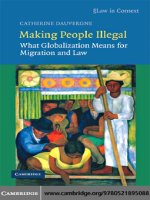cambridge university press comparative politics rationality culture and structure feb 2009 kho tài liệu bách khoa
Bạn đang xem bản rút gọn của tài liệu. Xem và tải ngay bản đầy đủ của tài liệu tại đây (4.12 MB, 520 trang )
This page intentionally left blank
Comparative Politics
Second Edition
Comparative Politics: Rationality, Culture, and Structure is the completely revised
second edition of the volume that guided thousands of scholars through the
intellectual demands and gratifications of comparative political science. Retaining
a focus on the field’s research schools, it now pays parallel attention to the pragmatics of causal research. Mark Irving Lichbach begins with a review of discovery,
explanation, and evidence, and Alan S. Zuckerman argues for explanations with
social mechanisms. Ira Katznelson, writing on structuralist analyses, Margaret
Levi on rational choice theory, and Marc Howard Ross on culturalist analyses,
assess developments in the field’s research schools. Subsequent chapters explore
the relationship among the paradigms and current research: Joel S. Migdal examines
the state; Mark Blyth adds culturalist themes to work on political economy; Etel
Solingen locates the international context of comparative politics; Doug McAdam,
Sidney Tarrow, and Charles Tilly address contentious politics; Robert Huckfeldt
explores multilevel analyses; Christopher J. Anderson describes nested voters;
Jonathan Rodden examines endogenous institutions; Isabela Mares studies welfare
states, and Kanchan Chandra proposes a causal account of ethnic politics. The
volume offers a rigorous and exciting assessment of the past decade of scholarship in
comparative politics.
Mark Irving Lichbach is Professor and Chair of Government and Politics at the
University of Maryland. A theorist interested in social choice and a comparativist
interested in globalization, Lichbach explores the connections between collective
action theories and political conflict as well as the connections between collective
choice theories and democratic institutions. He is the author or editor of many
books, including the award-winning The Rebel’s Dilemma, and of numerous articles
that have appeared in scholarly journals in political science, economics, and
sociology.
Alan S. Zuckerman is Professor of Political Science at Brown University. His most
recent books are Partisan Families: The Social Logic of Bounded Partisanship in Germany
and Britain (with Josip Dasovic´ and Jennifer Fitzgerald), the winner of the
International Society of Political Psychology’s award for the best book published
in 2007, and The Social Logic of Politics: Personal Networks as Contexts for Political
Behavior (2005). Zuckerman edits the book series on The Social Logic of Politics for
Temple University Press. During the spring semester 2007, he was the Lady Davis
Visiting Professor of Political Science at the Hebrew University of Jerusalem.
Cambridge Studies in Comparative Politics
General Editor
Margaret Levi University of Washington, Seattle
Assistant General Editor
Stephen Hanson University of Washington, Seattle
Associate Editors
Robert H. Bates Harvard University
Torben Iversen Harvard University
Stathis Kalyvas Yale University
Peter Lange Duke University
Helen Milner Princeton University
Frances Rosenbluth Yale University
Susan Stokes Yale University
Sidney Tarrow Cornell University
Kathleen Thelen Northwestern University
Erik Wibbels Duke University
Other Books in the Series
David Austen-Smith et al., eds., Selected Works of Michael Wallerstein:
The Political Economy of Inequality, Unions, and Social Democracy
Lisa Baldez, Why Women Protest: Women’s Movements in Chile
Stefano Bartolini, The Political Mobilization of the European Left, 1860–1980:
The Class Cleavage
Robert Bates, When Things Fell Apart: State Failure in Late-Century Africa
Mark Beissinger, Nationalist Mobilization and the Collapse of the Soviet State
Nancy Bermeo, ed., Unemployment in the New Europe
Carles Boix, Democracy and Redistribution
Carles Boix, Political Parties, Growth, and Equality: Conservative and Social
Democratic Economic Strategies in the World Economy
Catherine Boone, Merchant Capital and the Roots of State Power in Senegal,
1930–1985
Continued after the Index
Comparative Politics
RATIONALITY, CULTURE,
AND STRUCTURE
SECOND EDITION
Edited by
MARK IRVING LICHBACH
University of Maryland
ALAN S. ZUCKERMAN
Brown University
CAMBRIDGE UNIVERSITY PRESS
Cambridge, New York, Melbourne, Madrid, Cape Town, Singapore, São Paulo
Cambridge University Press
The Edinburgh Building, Cambridge CB2 8RU, UK
Published in the United States of America by Cambridge University Press, New York
www.cambridge.org
Information on this title: www.cambridge.org/9780521885157
© Cambridge University Press 2009
This publication is in copyright. Subject to statutory exception and to the
provision of relevant collective licensing agreements, no reproduction of any part
may take place without the written permission of Cambridge University Press.
First published in print format 2009
ISBN-13
978-0-511-47935-9
eBook (EBL)
ISBN-13
978-0-521-88515-7
hardback
ISBN-13
978-0-521-71234-7
paperback
Cambridge University Press has no responsibility for the persistence or accuracy
of urls for external or third-party internet websites referred to in this publication,
and does not guarantee that any content on such websites is, or will remain,
accurate or appropriate.
For
Faye
and Ricki,
again and always
Contents
Contributors
Preface and Acknowledgments
1
PARADIGMS AND PRAGMATISM: COMPARATIVE
POLITICS DURING THE PAST DECADE
page xi
xv
1
Mark Irving Lichbach and Alan S. Zuckerman
2
THINKING AND WORKING IN THE MIDST OF
THINGS: DISCOVERY, EXPLANATION, AND
EVIDENCE IN COMPARATIVE POLITICS
18
Mark Irving Lichbach
3
ADVANCING EXPLANATION IN COMPARATIVE
POLITICS: SOCIAL MECHANISMS, ENDOGENOUS
PROCESSES, AND EMPIRICAL RIGOR
72
Alan S. Zuckerman
4
STRONG THEORY, COMPLEX HISTORY:
STRUCTURE AND CONFIGURATION IN
COMPARATIVE POLITICS REVISITED
96
Ira Katznelson
5
RECONSIDERATIONS OF RATIONAL CHOICE
IN COMPARATIVE AND HISTORICAL ANALYSIS
117
Margaret Levi
6
CULTURE IN COMPARATIVE POLITICAL
ANALYSIS
134
Marc Howard Ross
7
RESEARCHING THE STATE
162
Joel S. Migdal
8
AN APPROACH TO COMPARATIVE ANALYSIS OR
A SUBFIELD WITHIN A SUBFIELD? POLITICAL
ECONOMY
193
Mark Blyth
ix
Contents
x
9
THE GLOBAL CONTEXT OF COMPARATIVE
POLITICS
220
Etel Solingen
10
COMPARATIVE PERSPECTIVES ON
CONTENTIOUS POLITICS
260
Doug McAdam, Sidney Tarrow, and Charles Tilly
11
CITIZENSHIP IN DEMOCRATIC POLITICS:
DENSITY DEPENDENCE AND THE
MICRO–MACRO DIVIDE
291
Robert Huckfeldt
12
NESTED CITIZENS: MACROPOLITICS AND
MICROBEHAVIOR IN COMPARATIVE POLITICS
314
Christopher J. Anderson
13
BACK TO THE FUTURE: ENDOGENOUS
INSTITUTIONS AND COMPARATIVE POLITICS
333
Jonathan Rodden
14
THE COMPARATIVE POLITICAL ECONOMY OF
THE WELFARE STATE
358
Isabela Mares
15
MAKING CAUSAL CLAIMS ABOUT THE EFFECT
O F “E T H N I C I T Y ”
376
Kanchan Chandra
References
413
Author Index
481
Subject Index
494
Contributors
Christopher J. Anderson is Professor of Government and Director of the
Institute for European Studies at Cornell University. His research examines
the microfoundations of democracy and political economy in comparative
perspective. His most recent book is Losers’ Consent: Elections and Democratic
Legitimacy (Oxford University Press, 2005; with Andre´ Blais, Shaun Bowler,
Todd Donovan, and Ola Listhaug), and he recently coedited Democracy,
Inequality, and Representation: A Comparative Perspective (Russell Sage
Foundation, 2008; with Pablo Beramendi). His current research projects
investigate the impact of welfare state policies on people’s social and economic
behavior.
Mark Blyth is an associate professor of political science at the Johns Hopkins
University. His research interests lie in the fields of comparative and
international political economy. He is the author of Great Transformations:
Economic Ideas and Institutional Change in the Twentieth Century (Cambridge
University Press, 2002). He is currently engaged in several projects: a book on
party politics in advanced welfare states called “The New Political Economy of
Party Politics,” a volume on constructivist theory and political economy
entitled “Constructing the Global Economy,” and a volume that surveys IPE
around the world entitled “IPE as a Global Conversation.” His articles have
appeared in the American Political Science Review, Perspectives on Politics,
Comparative Politics, World Politics, and West European Politics.
Kanchan Chandra works on the causes and consequences of the politicization
of ethnic identities. She is an associate professor in the Department of Politics
at New York University.
Robert Huckfeldt is a Distinguished Professor of Political Science at the
University of California, Davis. His interests lie in the areas of elections, public
opinion, participation, social contexts, and political communication networks.
He is the author or coauthor of several books, including Politics in Context; Race
and the Decline of Class in American Politics; Citizens, Politics, and Social
xi
xii
Contributors
Communication; and Political Disagreement, as well as a series of articles
concerned with the relationships among groups and individuals in politics.
Ira Katznelson is Ruggles Professor of Political Science and History at
Columbia University. His most recent books are Liberal Beginnings: Making a
Republic for the Moderns (coauthored with Andreas Kalyvas, 2008), When
Affirmative Action Was White: An Untold History of Racial Inequality in TwentiethCentury America (2005), and Desolation and Enlightenment: Political Knowledge
after Total War, Totalitarianism, and the Holocaust (2003). He served as president
of the American Political Science Association for 2005–2006.
Margaret Levi is Jere L. Bacharach Professor of International Studies in the
Department of Political Science at the University of Washington. Her soleauthored books include Of Rule and Revenue and Consent, Dissent, and Patriotism.
She is the coauthor of Analytic Narratives and Cooperation Without Trust. She is a
former president of the American Political Science Association and the general
editor of the Cambridge Studies in Comparative Politics series and of the Annual
Review of Political Science.
Mark Irving Lichbach is Professor and Chair of Government and Politics at
the University of Maryland. He received a B.A. (1973) from Brooklyn College
of the City University of New York, an M.A. (1975) from Brown University,
and a Ph.D. (1978) in political science from Northwestern University. A
theorist interested in social choice and a comparativist interested in
globalization, Lichbach explores the connections between collective action
theories and political conflict as well as the connections between collective
choice theories and democratic institutions. He is the author or editor of many
books, including the award-winning The Rebel’s Dilemma, and of numerous
articles that have appeared in scholarly journals in political science, economics,
and sociology. His work has been supported by NSF and private foundations.
Lichbach, who was Book Review Editor of the American Political Science Review
(1994–2001) and editor of the University of Michigan’s Series on Interests,
Identities, and Institutions, also served as chair of the political science
departments at the University of Colorado (1995–1998) and the University of
California, Riverside (1998–2001).
Isabela Mares is Associate Professor of Political Science at Columbia
University, where she teaches courses on comparative political economy and
comparative social policy. Her first book, The Politics of Social Risk: Business and
Welfare State Development (Cambridge University Press, 2003), won the
Gregory Luebbert Award for best book in comparative politics awarded by
the APSA and the Best First Book in European politics awarded by the Council
for European Studies. Her recent book, Taxation, Wage Bargaining, and
Unemployment (Cambridge University Press, 2006), examines the consequences
of the growth of the fiscal burden of the welfare state on unions’ wage
Contributors
xiii
bargaining strategies and on employment outcomes in advanced industrialized
societies. She is currently completing a new book examining the relationship
between inequality and social spending in developing countries.
Doug McAdam is Professor of Sociology at Stanford University. He is the
author or coauthor of eight books and more than 60 articles in the area of
political sociology, with a special emphasis on the study of social movements
and revolutions. His best known works include Political Process and the
Development of Black Insurgency, 1930–1970; Freedom Summer; and Dynamics of
Contention (with Sid Tarrow and Charles Tilly). He was elected to the American
Academy of Arts and Sciences in 2003.
Joel S. Migdal is the Robert F. Philip Professor of International Studies in the
University of Washington’s Henry M. Jackson School of International Studies.
He was the founding chair of the University of Washington’s International
Studies Program. Dr. Migdal was formerly associate professor of Government
at Harvard University and senior lecturer at Tel-Aviv University. Among his
books are Peasants, Politics, and Revolution; Palestinian Society and Politics; Strong
Societies and Weak States; State in Society; Through the Lens of Israel; The Palestinian
People: A History (with Baruch Kimmerling); and Boundaries and Belonging. In
1993, he received the University of Washington’s Distinguished Teaching
Award; in 1994, the Washington State Governor’s Writers Award; in 2006, the
Marsha L. Landolt Distinguished Graduate Mentor Award; and, in 2008, the
Provost Distinguished Lectureship.
Jonathan Rodden is Associate Professor of Political Science at Stanford
University. His work focuses on the political economy of institutions. He has
written a series of papers on federalism, decentralization, and distributive
politics. His most recent book, Hamilton’s Paradox: The Promise and Peril of Fiscal
Federalism (Cambridge University Press, 2006), won the 2007 Luebbert Prize in
comparative politics. He is currently working on a series of papers and a book
manuscript on economic and political geography, as well as a series of papers on
issue voting.
Marc Howard Ross was educated at the University of Pennsylvania and
Northwestern University and is William R. Kenan, Jr., Professor of Political
Science at Bryn Mawr College, where he has taught since 1968. He has done
research in Canada, East Africa, France, Northern Ireland, the Middle East, and
most recently in Spain and South Africa. His current work has two major
themes: (1) the role that cultural performance and memory play in the
escalation and de-escalation of ethnic conflict and (2) social science theories of
conflict and their implications for conflict management. He has written or
edited eight books, including Cultural Contestation in Ethnic Conflict (Cambridge
University Press, 2007), Culture and Belonging: Symbolic Landscapes and Contested
Identities in Divided Societies (University of Pennsylvania Press, 2009), The
xiv
Contributors
Culture of Conflict, and The Management of Conflict (Yale University Press, 1993),
and more than 75 articles that have appeared in academic journals and books.
Etel Solingen is Professor of Political Science at the University of California,
Irvine, and author of Nuclear Logics: Contrasting Paths in East Asia and the Middle
East (Princeton University Press, 2007); Regional Orders at Century’s Dawn:
Global and Domestic Influences on Grand Strategy (Princeton University Press,
1998); and Industrial Policy, Technology, and International Bargaining (Stanford
University Press, 1996). Her articles on the links between domestic and
international politics have appeared in the American Political Science Review,
International Organization, Comparative Politics, International Studies Quarterly,
International Security, Journal of Theoretical Politics, Journal of Democracy, Journal
of Peace Research, International Relations of Asia-Pacific, Asian Survey, Global
Governance, and International History Review, among others.
Sidney Tarrow teaches government and sociology at Cornell University. His
most recent books are Power in Movement (Cambridge University Press, 1998),
The New Transnational Activism (Cambridge University Press, 2005), and (with
Charles Tilly) Contentious Politics (Paradigm, 2006). He is currently interested in
transnational activism on behalf of human rights.
Until his untimely death in April 2008, Charles Tilly was Joseph L.
Buttenwieser Professor of Social Science at Columbia University. His latest
books include Democracy (Cambridge University Press, 2007), Explaining Social
Processes (2008), and the posthumous Contentious Performances, also published by
Cambridge (2008).
Alan S. Zuckerman is Professor of Political Science at Brown University. His
most recent books are Partisan Families: The Social Logic of Bounded Partisanship
in Germany and Britain (with Josip Dasovic´ and Jennifer Fitzgerald), the winner
of the International Society of Political Psychology’s award for the best book
published in 2007, and The Social Logic of Politics: Personal Networks as Contexts for
Political Behavior (2005). Zuckerman edits the book series on The Social Logic of
Politics for Temple University Press. During the spring semester 2007, he was
the Lady Davis Visiting Professor of Political Science at the Hebrew University
of Jerusalem.
Preface and Acknowledgments
Who now reads Max Weber? Seventy years ago, Talcott Parsons began his
magisterial study of social thought by asking Crane Brinton’s question about
Herbert Spencer. Parsons demonstrated that by the end of the first third of the
twentieth century, Weber’s, Durkheim’s, Pareto’s, and Marshall’s scholarship
had eclipsed Spencer’s social science and of the four theorists, Weber deserved
pride of place. Has knowledge of Weber’s social science among the current
generation of students and professors of comparative politics mimicked the
earlier abandonment of Spencer’s social analysis?
When the senior comparativists in this volume attended graduate school,
they studied Max Weber. From him, they learned about theories of regime
types and transformation, economic development, bureaucracies, rationality,
religion and politics, philosophy of social science, the tension between formal
government and democratic processes, and a deep critique of modernity and
of Marxist theory, among a host of basic matters. Most important, they
developed an appreciation for grand questions of politics encased in theory and
method.
Today, graduate studies in comparative politics more closely resemble
professional training than library reading. Highlighting methods, students are
taught that the best work combines fieldwork, interviews, surveys, archival work,
experiments, and statistics, as well as formal models. Explaining substantive
puzzles with causal arguments buttressed by extensive methods occupies the
field’s center. Successful scholarship displays the best techniques of analysis.
Weber understood that there is no opposition between mastering methods and
social, economic, and political analysis. Moreover, he taught that scholarship
demands examination of important questions, offering theoretically informed
causal stories as well as applying the most appropriate methods. And so, following
Weber, we have organized this volume around the interaction between
paradigms – approaches to ontology, theory, and methods – and the pragmatics of causal analysis.
In this second edition of our volume, our colleagues and we interpret the
state of comparative politics today, more than a decade after the first volume.
The field has changed, and so the essays analyzing it have changed too.
xv
xvi
Preface and Acknowledgments
Another reason to offer a second edition is to update the service provided to
young scholars of comparative politics across the globe. The volume serves as a
survey and analysis of the field, and apparently, cohorts of graduate students
have read and benefited from the essays in the first edition. We want to thank
them for being attentive readers and to thank their teachers who thought that
the volume would benefit their students. We hope that the second edition plays
the same helpful role in the lives of many other graduate students in political
science.
One of the gifts of publishing is the opportunity to express public and formal
appreciation to people who offer assistance. It is a pleasure to thank Lew
Bateman, our editor at Cambridge University Press, a persistent and wise guide,
and our colleague Margaret Levi, who also leads (as well as edits) the Press’s
series on comparative politics, in which the first and this edition of the book
appear. It is an honor to be in such impressive company. Thanks too to the
Rockefeller Foundation for sponsoring a meeting at the Bellagio Conference
and Study Center in October 2006. Conversations and exchanges of views at
their superlative site initiated the work of this second edition. In addition, we
offer our gratitude to several authors of the chapters – Margaret Levi, Ira
Katznelson, Marc Ross, and Sidney Tarrow – for wise counsel as the project has
unfolded.
1
Paradigms and Pragmatism
Comparative Politics during the Past Decade
Mark Irving Lichbach and Alan S. Zuckerman
introduction
Students of comparative politics explain electoral behavior, political networks,
political institutions, contentious politics, comparative political economies,
welfare states, international-comparative linkages, and the state. Their interest
in the pragmatic and causal analysis of these critical political questions defines
the “messy center”1 of comparative politics. The first edition of this volume
emphasized the field’s research paradigms, placing rationality, culture, and
structure in the subtitle. In the decade or so since the first edition was published,
tension between these two perspectives on the field has persisted. Contrasts
between research paradigms and pragmatic causal accounts provide the intellectual friction that drives much of our research. These alternative foci structure
this edition’s themes and problems.
Aiming to transcend a battle of the paradigms, Alan Zuckerman’s chapter
advances an explanatory strategy that is one such way forward. Explanations in
comparative politics, he maintains, must meet clear standards: The more that are
met, the better the results. The criteria include social mechanisms (a particular
form of causal mechanism) that are derived from strong theoretical propositions.
Convincing explanations also require empirical evidence of the specified
explanatory processes. Because the ontology of politics demands that the
explanations apply to stochastic, multilevel, and endogenous phenomena, simple
causal claims are insufficient.
Applying social mechanisms with high prior probabilities of explanatory
power and employing appropriate statistical techniques transforms the language
of explanation from imprecise verbal accounts into clear and specific arguments.
The results move explanation along a scale from the mistaken to the demonstrated. As an attempt to convince by doing, Zuckerman applies his message
1
This characterization of the field appeared first in the symposium in World Politics, on the role of
theory in comparative politics, published in 1996. It is meant to convey a multimethod approach
that draws from many theories.
Our thanks to Sidney Tarrow and Joel Migdal for comments on earlier drafts of this chapter.
1
Mark Irving Lichbach and Alan S. Zuckerman
2
to research on partisanship and on political violence. In his view, research
paradigms are a source of strong explanatory hypotheses, but they are not the
sum total of scholarship in comparative politics.
Mark Lichbach’s chapter advances a somewhat different perspective on
contemporary comparative politics: While overt paradigm wars have been
dampened, paradigm-driven teaching and thinking persists. In the field’s toolboxes and cookbooks, paradigms continue to provide the content and direction –
the underlying purpose and logic – for many contemporary comparativists. Most
importantly, they fuel the field’s creative impetus.
The second edition of Comparative Politics assesses the role that research
paradigms and pragmatic explanatory strategies currently play in the field. In
order to bring assessments of the debate among the paradigms up-to-date, we
asked our authors to address several questions:
How have the dynamics among rationality-culture-structure played out?
What are the different types of responses to the battle of the paradigms?
How do scholars currently treat the approaches? Are rationality-culturestructure comparisons no longer central to the field? Do researchers
still begin their research with an interparadigmatic dialogue in mind?
Do they still use the debate to evaluate existing theories? When
developing new theories, do they still return to the debate?
Have the paradigms converged or do they remain distinct? Which metaphor best characterizes the field: separate tables, a messy center of
convergence, or a mixed bag of partial synergisms? Is there a new
paradigm war, with culturalists and constructivists as today’s paradigm
warriors, on the horizon?
Do multiple perspectives shed more light than heat? Are creative research
moves often based on appeals to ideal-type paradigms? Does competition among paradigms move the field and promote progress by generating critical reflection, fashioning significant evidence, and
improving important concepts?
While the authors of our theoretical chapters – on rationality, culture, and
structure – and of our substantive chapters organize their contributions in
their own ways, all examine the field’s paradigms and pragmatic strategies of
explanation.
the chapters
We begin with two general chapters, Lichbach’s assessment of efforts to move
past the debate about research schools and Zuckerman’s attempt to improve
explanations in comparative politics. Both highlight the volume’s links between
paradigms and causal analyses. Structural and rationalist analyses applied to the
messy center follow. Ira Katznelson and Margaret Levi provide theoretical
overviews of structure and rationality, respectively, that demonstrate an
Paradigms and Pragmatism
3
emerging consortium. We then turn to movements against the mainstream.
Marc Ross offers a theoretical overview of culture. Joel Migdal’s discussion of
the state indirectly points to, and Mark Blyth’s analysis of comparative political
economy more directly discusses, the growing significance of constructivism.
Two chapters then illustrate the center’s dialogue between research paradigms
and causal pragmatism: Etel Solingen considers global–domestic linkages and
Doug McAdam, Sidney Tarrow, and Charles Tilly analyze the field of contentious politics. The volume then considers ways that comparativists fortify the
field’s center by elaborating causal explanations. Robert Huckfeldt’s analysis of
political networks and Christopher J. Anderson’s review of the literature on mass
political behavior emphasize macro–micro connections and the need for multilevel analyses. Uncovering endogenous causal relationships provides the theme
of Jonathan Rodden’s review of institutions and political economy. Isabela
Mares delves deeply into causal analyses of welfare states. Finally, Kanchan
Chandra discusses the problem of making causal claims about ethnicity and
politics, the research domain in comparative politics that has been most affected
by recent constructivist thought.
The Messy Center: Big-Picture Pragmatism
“Now we political economists have a pedantic custom,” writes Max Weber in his
classic essay “Science as a Vocation” (1946: 129), “which I should like to follow,
of always beginning with the external conditions.” Following Weber, Ira
Katznelson would have comparativists begin with the contemporary world’s
major force – modern liberalism, as it developed in the West. Katznelson suggests that robust problem-solving scholarship and the revival of large-scale
studies have renewed the prospects of institutional studies that combine strong
theory, a configurational approach to causality, and respect for history’s variety.
These efforts continue established research programs on the dominant structures of modernity – capitalism, civil society, the state, and the state system. A
close critical focus on liberalism offers comparative politics a similarly energetic
focus.
Even as Katznelson sees the biggest of pictures, he adopts an eclectic research
strategy. In a theme that reappears in many of the chapters, Katznelson
demonstrates a “pragmatic attitude about method.” Displaying a “healthy disrespect for overly stylized battles about paradigms,” he wants to employ “a range
of analytical traditions to answer tough and meaningful questions” about
“important problems.” Katznelson urges “problem-focused writing that exhibits
little respect for traditional divisions within comparative politics” such as
political economy, contentious politics, and electoral studies. Utilizing multiple
methods – archives, surveys, ethnography, experiments, and cross-national statistics – helps the field transcend “inductive variable–centered strategies.” He
also urges comparativists to “refuse to choose between positive and normative
orientations.” Believing that many “intersecting modes of investigation” can
produce findings that illuminate questions that are empirically grounded, ones
4
Mark Irving Lichbach and Alan S. Zuckerman
rich in knowledge of time and place, Katznelson advocates a style of comparative
inquiry that is “realist and concrete rather than nominal and abstract, [one]
aimed at discerning a ‘sweet spot’ located in the zone between high abstraction
and particular specification.”
Even so, Katznelson cautions against excessive pragmatism. Following ideas
he advanced in his chapter for the volume’s first edition, Katznelson has little use
for “highly targeted studies” of limited ambition that produce “substantive and
conceptual retrenchment” from the great works of the past. Without the sort of
larger project focused on Western liberalism that he advocates, “thematic literatures threaten to remain confined within specialized conversations, and
possibilities for integrating findings across a range of discoveries are likely to stay
artificially abridged.” Katznelson thus worries about the decentering of comparative politics – the heterogeneity and diversity in subjects, questions, and
studies that inevitably accompany a diverse toolkit. Katznelson seeks a bigpicture pragmatism that can contain the field’s tensions and contradictions.
Applying a rational choice approach, Margaret Levi also advocates research
pragmatism that aims at big questions. Her chapter details significant substantive, methodological, and theoretical advances in rational choice analysis that
allows rationalists to employ manageable research strategies to probe the big
picture. Levi discusses how, over the past decade, rational choice comparativists
have indeed helped to redirect comparative politics toward goals that she shares
with Katznelson.
The successes of the comparative and historical mode of rational choice
theory derive in part from debates with culturalists and structuralists. Even as
convergence across the research schools grows, Levi maintains, paradigms
remain: “While the paradigm wars . . . have certainly subsided, they have not
disappeared entirely. Paradigmatic distinctions remain relevant both to
training and to research.” She further notes, “what divides [paradigms] is
method in the sense of how to construct theory and organize research findings.
Rationalists continue to emphasize methodological individualism and strategic
interaction.” While some debates remain, the best comparative work, Levi
claims, now uses many sophisticated methods, involving some mix of field
work, interviews, surveys, archival work, experiments, and statistics in addition
to formal logic. She thus advocates a “multiplicity of methods as well as
approaches” that “blurs the lines among approaches” and is “methodologically
pluralistic.” As Levi puts it, “not everyone does everything, but everyone seems
to do several things.”
By urging comparativists to “combine a nuanced understanding of the
complexity of a particular (often unique) situation or set of events with a general
theoretical understanding,” Levi echoes Katznelson’s big-picture pragmatism.
Rational choice theory ensures that research has microfoundations, paying
attention to the constraints on and the strategic interactions among the actors
whose aggregated choices produce significant outcomes. A comparative and
historical sensibility ensures that research respects context, which means that
comparativists address important empirical and normative concerns. From their
Paradigms and Pragmatism
5
different starting points, Katznelson and Levi place historical and rational choice
institutionalism at the very attractive messy center of comparative politics.
Pushing against the Mainstream: Culture and Constructivism
Marc Ross is less willing to accept the field’s current configuration. He reminds
comparativists how culture is important to the study of politics: It provides a
framework for organizing people’s daily worlds – locating the self and others in
them and making sense of the actions and motives of others – for grounding an
analysis of interests, for linking identities to political action, and for predisposing
people and groups toward specific actions and away from others. Moreover,
“placing the concept of culture at the center of analysis,” Ross maintains, “affects
the questions asked about political life.” Culture organizes meanings and
meaning-making, defining social and political identity, structuring collective
actions, and imposing a normative order on politics and social life.
Taking culture seriously means moving toward “a strong view of culture,”
one that entails an “intersubjective understanding of culture.” Ross believes that
“reducing culture to the sum of individual attitudes,” as is found in survey
research, “is hardly adequate . . . culture is not a property of single individuals.
Rather, it is an emergent property rooted in social practices and shared understandings that cannot be uncovered through survey data alone.” Even though
many comparativists may be unfamiliar with the “interactive, constructed nature
of culture,” he believes that this approach can make a significant contribution to
the study of comparative politics.
Ross’s research pragmatism draws him close to Katznelson and Levi at the
field’s center, as it distances him from culturalists whose postmodern relativism
stresses the highly constructed nature of reality. Like all the authors in this
volume, he agrees that “comparison is central to the social science enterprise”
and that it employs many different sorts of evidence: “The most successful work
linking culture and politics will not rely on only one source of data or a single
tool for data analysis.” Applying a full range of evidence in the pursuit of causal
analyses draws Ross’s approach toward the field’s messy center.
Joel Migdal places the “comparative politics of the state” at the field’s center,
even as he also respectfully moves apart from the mainstream. Migdal suggests
that comparisons have relied heavily on a universal template or image of what the
state is and does. This universal standard has strained under the widening
diversity of states, especially those formed after World War II. Appreciating the
effects of globalization, his chapter offers an alternative understanding of this
critical concept.
Studying the state, Migdal suggests, involves probing a multilayered, multipurpose entity whose parts frequently work at cross-purposes. This political
institution operates in a similarly complex multitiered environment, which
deeply affects the state and, in turn, is affected by the state. “All this complexity
has turned the experience of researching the state into an eclectic enterprise. It
demands a full toolkit – an amalgamation of culturalist, structuralist, and
6
Mark Irving Lichbach and Alan S. Zuckerman
rationalist tools and of historical, case, and quantitative methods” because
“different perspectives highlight the variegated visages of the state and their
interactions with their domestic, regional, and global environments.” Appropriate research combines quantitative large-N research and qualitative singlecase analysis and new forms of historical analysis, charting new directions in
comparative research. Good research contextualizes the state, seeking to
“combine specialized country or area knowledge (which usually is focused on the
different practices of diverse states) with more general theories of state formation and behavior.” Furthermore, research is most valuable when it moves from
linear, causal models toward process-oriented analysis and from comparative
statics to historical analysis, emphasizing the importance of temporality and of
sequencing.
How does Migdal relate to the field’s paradigms? Consistent with his
explanatory pragmatism, he recognizes the importance of rational choice analyses of the state: “States’ political trajectories [are] deeply influenced by the giveand-take, negotiation, collaboration, and contestation between central state
authorities (themselves sometimes fragmented) and dispersed, but locally powerful, social forces.” However, Migdal expresses reservations about rationalist
theorizing: “The population is not simply an aggregate of diverse rational
individuals but a collective that transcends those individuals and that gives birth
to, and then loyally engages and stands behind, the state.” While recognizing the
“actual baffling diversity of states,” Migdal is not interested in the rationalist
program of exploring how institutions aggregate this variation into state policies
and practices. His references to the “transcendental unity of the people,” to
“transcending aggregated individual preferences,” and to the “general will,
legitimacy, social solidarity, and unity of allegiance” are likely to make rationalists uneasy. Interested in the convergence of history and institutions, he
maintains that contemporary approaches are “neglecting culturalist factors” and
that “the cultural approach still seems generally to get short shrift.” Migdal’s
stress on the significance of culture as understood within institutions uncovers
the fragile unity of the messy center of comparative politics.
As Mark Blyth attempts to define the field of political economy, he offers
another respectful critique of the mainstream. His chapter begins by noting that
“hard-won empirical research showed that the economy was inseparable from
politics. Modern political economy showed that if one wanted to understand
significant variations in economic outcomes, then embracing the mutual
implications of states and markets was a pretty good place to start.” One does not
do political economy, according to Blyth, by beginning with the research
paradigms of rationality, culture, and structure, as if they contain toolboxes of
foundational heuristics. Rather, he suggests that political economists employ
a “troika of ‘interests,’ ‘institutions,’ and ‘ideas’” in which “all three of these
positions are vibrant research programs.”
Like Ross, Blyth advances constructivist claims about the importance of ideas.
He contends that “exogenous shocks to agents’ material positions do not
unproblematically translate into new political preferences” because “exogenous
Paradigms and Pragmatism
7
economic changes rarely, if ever, telegraph into agents’ heads ‘what has gone
wrong’ and ‘what should be done.’” Many political economists eventually recognized that “ideas and ideologies needed to be taken seriously as explanatory
concepts in their own right.” Put differently, “ideas do not merely describe
the world; they also help bring that world into being.” The “particular
construction[s] of the political economy agents develop and deploy help bring
into being that which is described rather than simply describing an already
existing state of affairs.” Comparativists thus should be “investigating how the
action of employing ideas that seek to represent or measure a given phenomenon
brings the phenomenon into being.” “What globalization ‘is,’” for example, “is
itself constructed differentially across nations” by different sets of actors.
If “agents’ subjectivities and interests can be reconstructed despite their
ostensible structural positions,” constructivists wonder whether materialist
theories of history reinterpret history as per their theories, “sacrificing historical
accuracy for theoretical fit.” Do actual political actors ever think the way that the
theories say they do? In other words, “can one really link actors’ intentions to
outcomes via their material interests, as this literature presumes”? As “ideational
approaches drop below the level of the possible to investigate what real actors
thought and did,” they challenge mainstream thinking about interests and
institutions. “Once ‘let out of the box,’ ideas ‘have a life of their own’ and can
take interests in new and unexpected directions.” Blyth thus warns, “if contingency, construction, and interdependent effects are as replete as at least some of
these [constructivist] scholars say they are, then the question of whether political
economy can aspire to the status of a predictive science is questionable at best.”
During the past 10–12 years, these chapters suggest, comparativists
have responded to the field’s research paradigms in alternative ways. While
Katznelson and Levi depict a convergence around the study of history and
institutions, Migdal introduces and Ross and Blyth deepen a culturalist critique
of this perspective. Katznelson and Migdal offer big concepts: liberalism and the
state, respectively, as unifying themes for future scholarship. All, however, share
a vision of research that pragmatically draws on an eclectic array of tools.
Fortifying the Center: Research Paradigms and Causal Analysis
Given the disparate research tools in comparative politics, comparativists confront thorny questions about research schools and causal explanations. As the
volume proceeds, the chapters move more deeply into these issues. The next two
chapters, Etel Solingen’s analysis of global–domestic linkages and McAdam,
Tarrow, and Tilly’s exploration of contentious politics, highlight the efforts to
speak both to paradigms and to pragmatic demands of causal research.
The relationship between comparative and international politics has a long
intellectual pedigree – indeed, the distinction between the two fields confuses
laypeople. Etel Solingen brings the literature on the international sources of
domestic politics into the era of globalization. Focusing primarily on work
published since the volume’s first edition, she examines comparative politics as









